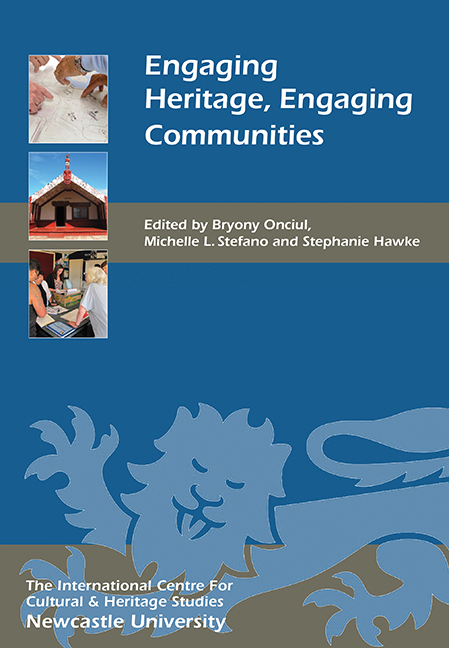Book contents
- Frontmatter
- Contents
- List of Illustrations
- Acknowledgments
- Introduction
- Engaging Concepts
- Engaging Creatively
- Engaging Challenges
- 12 Embattled Legacies: Challenges in Community Engagement at Historic Battlefields in the UK
- 13 At the Community Level: Intangible Cultural Heritage as Naturally-occurring Ecomuseums
- 14 Subaltern Sport Heritage
- 15 Museums and the Symbolic Capital of Social Media Space
- 16 Relational Systems and Ancient Futures: Co-creating a Digital Contact Network in Theory and Practice
- 17 Interview – Conal McCarthy
- List of Contributors
- Index
- Miscellaneous Endmatter
17 - Interview – Conal McCarthy
from Engaging Challenges
Published online by Cambridge University Press: 13 April 2017
- Frontmatter
- Contents
- List of Illustrations
- Acknowledgments
- Introduction
- Engaging Concepts
- Engaging Creatively
- Engaging Challenges
- 12 Embattled Legacies: Challenges in Community Engagement at Historic Battlefields in the UK
- 13 At the Community Level: Intangible Cultural Heritage as Naturally-occurring Ecomuseums
- 14 Subaltern Sport Heritage
- 15 Museums and the Symbolic Capital of Social Media Space
- 16 Relational Systems and Ancient Futures: Co-creating a Digital Contact Network in Theory and Practice
- 17 Interview – Conal McCarthy
- List of Contributors
- Index
- Miscellaneous Endmatter
Summary
Could you say something about your career so far, focusing on community engagement with heritage?
I have worked in galleries and museums since the late 1980s, in a variety of roles including education, public programmes, exhibition development, collections and curatorial. From 1996 to 2000 I was a developer at Te Papa involved in education, public programmes and interpretation, including discovery centres for children and some temporary exhibitions such as the iwi exhibition with the Te Aupouri people of Northland. Since then I have moved into an academic position in museum and heritage studies, but our teaching and work placements mean we have close links with museums and heritage organisations around the country. My research on museums and Māori also keeps me grounded in current practice; for example, my 2011 book entailed over 60 interviews between 2008 and 2010 with Māori and Pakeha professionals, academics and community leaders around the country.
What does the term community engagement mean to you?
In my work as a researcher and writer in museum studies it is something that I have to consider, unlike some academic subjects, because theory and practice are so closely intertwined, and because there are many resonances, applications and implications for my writing in current museum work. I am aware that in much recent literature by people such as Bernadette Lynch there is a critical appraisal of community work and terms such as ‘collaboration’, which is justified as there has been much vague language about ‘community’ in the museum sector over the last 20 years. That does not mean we should abandon community work, and in fact there is still a need for a closer relationship between community studies and museum studies, of which Elizabeth Crooke's work on community practice in what she calls the ‘active museum’ is an example (Crooke in McCarthy 2015). What we do need to do is define how we understand the term (for example, ethnic group, museum community or academic community), and look for real and meaningful ways to involve those communities in our work beyond the relatively obvious arena of events/public programmes, whether it is collections, exhibitions, policy formation or governance.
Information
- Type
- Chapter
- Information
- Engaging Heritage, Engaging Communities , pp. 227 - 230Publisher: Boydell & BrewerPrint publication year: 2017
